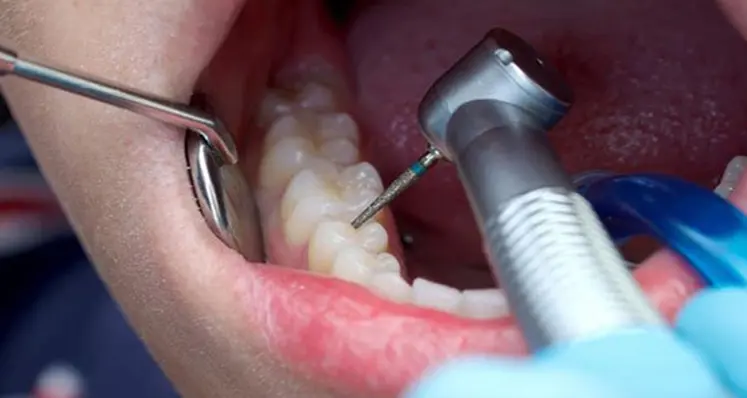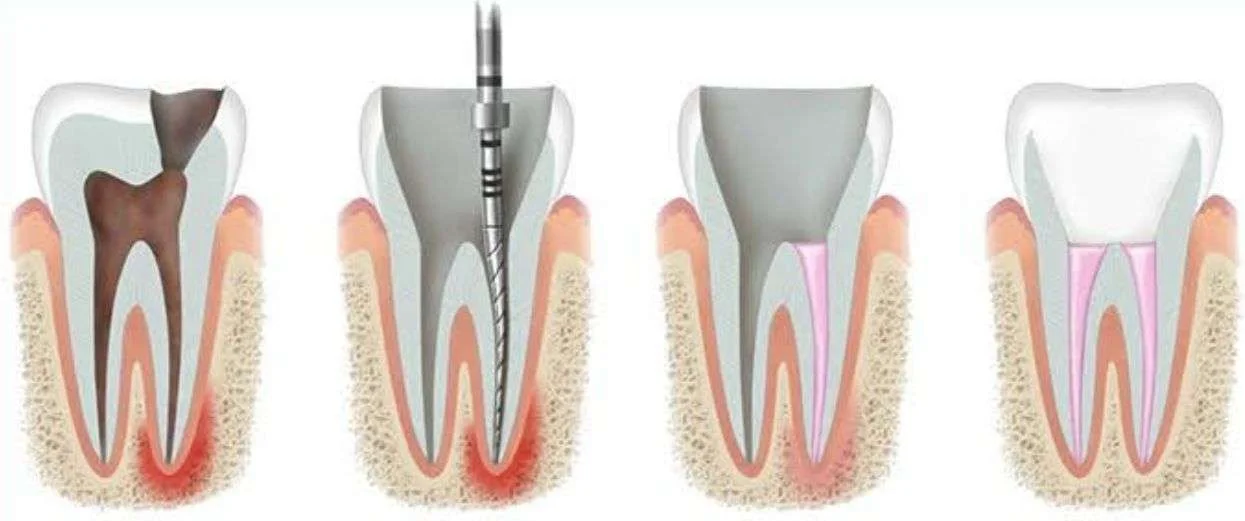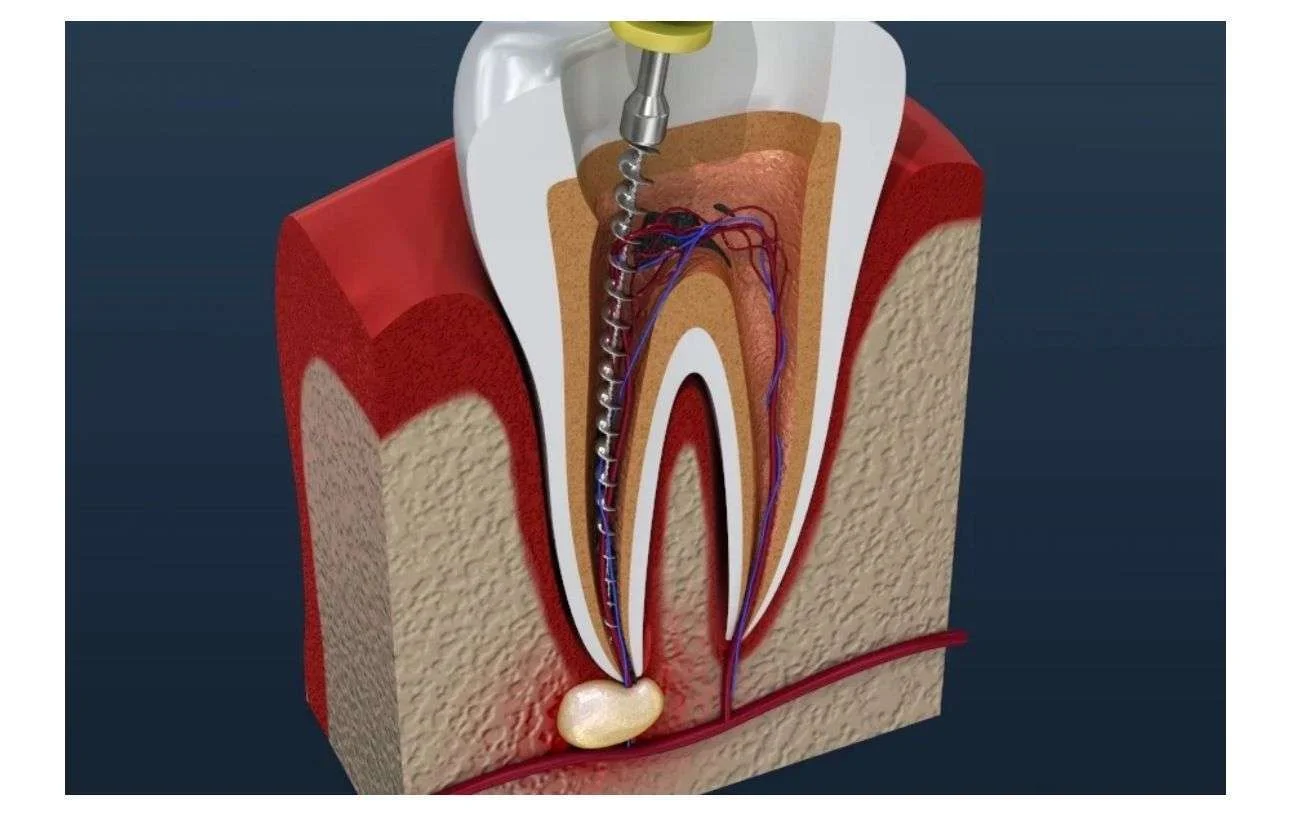
Painless Root Canal Treatment in Gurgaon
At The Dental Cure, we provide expert Root Canal Treatment in Gurgaon, ensuring a comfortable and effective experience for our patients.
Root canal treatment has long been associated with excruciating pain, a stereotype that has persisted for years. The mere mention of RCT can make many people squirm nervously. However, this perception is no longer based on facts. With advances in anesthesia and surgical techniques, RCT has become absolutely painless. In fact, root canal treatments in India are practiced with the most advanced technologies in the dental field.


Talk To A Dentist
DENTAL
CURE
WONDERING
WHAT IS BEST
FOR YOU?
Advantages of Root canal treatment
Pain Relief
Root canal treatment eliminates severe toothache pain caused by infection or inflammation in the tooth’s pulp, allowing for pain-free chewing and application of pressure.
Preservation of Natural Tooth
Unlike extraction, root canal treatment preserves your natural tooth, maintaining your natural smile and avoiding the need for artificial replacements like bridges or implants.
Prevention of Further Infection
By removing the infected or inflamed pulp, root canal treatment prevents the spread of infection to surrounding teeth and gums, thereby protecting your overall oral health.
Restoration of Functionality
After a root canal, the tooth is restored to its full functionality, allowing you to bite and chew without discomfort.
Aesthetic Maintenance
Root canal treatment can prevent tooth discoloration that often occurs with a damaged or infected tooth, helping you maintain a natural and healthy-looking smile.
Minimal Recovery Time
Compared to extraction and subsequent procedures for implants or bridges, root canal treatment typically involves a shorter recovery time, allowing you to resume normal activities quickly.
Cost-Effectiveness
Root canal treatment is often more cost-effective in the long run compared to the combined costs of tooth extraction, implants, and additional dental work required to replace a missing tooth.
Procedure of Root Canal Treatment
- Diagnosis and X-ray: The dentist begins by taking X-rays or examining existing X-rays to determine the location and extent of the damage or infection in the tooth.
- Anesthesia: Local anesthesia is administered to the affected tooth and surrounding area to ensure the patient is comfortable and pain-free during the procedure.
- Access Hole Creation: The dentist creates a small opening in the crown of the tooth to access the pulp chamber and root canals.
- Removal of Infected Pulp: Using specialized instruments, the dentist removes the infected or inflamed pulp tissue from the pulp chamber and root canals.
- Cleaning and Shaping: The root canals are thoroughly cleaned and shaped to remove any remaining debris and to prepare them for filling. This step often involves using tiny files and irrigation solutions.
- Filling the Canals: Once the canals are cleaned and shaped, they are filled with a biocompatible material called gutta-percha, which is a rubber-like substance. The gutta-percha is inserted into the canals and sealed with a cement to prevent future infection.
- Temporary Filling: A temporary filling is placed in the access hole to protect the tooth until a permanent restoration (such as a crown) can be placed.
- Permanent Restoration: After a few weeks, the temporary filling is removed and replaced with a permanent filling or crown. This step restores the tooth’s full function and appearance and provides additional strength and protection.
Post-Procedure Care
- Oral Hygiene: Maintain good oral hygiene by brushing twice a day and flossing at least once a day.
- Regular Dental Visits: Schedule regular cleanings and check-ups with your dentist to monitor the health of your treated tooth and overall oral health.
- Avoid Hard Foods: Avoid chewing on hard foods like ice, which can cause damage to the treated tooth and surrounding teeth.
Symptoms
- Severe toothache pain on chewing or on application of pressure
- Prolonged sensitivity (pain) to cold or hot temperatures (after the cold or heat has been removed)
- Discoloration (darkening) of tooth
- Swelling and tenderness of nearby gums
- Persistent or recurring pimples on the gums
- Sometimes, there may not be no symtoms.
What Our Customers Say About Dental Cure
Dental Implant Procedures
Getting dental implants typically requires two trips over 4-6 months. The first trip takes about 3-5 days, and the second trip usually lasts about a week. Here's a simple breakdown of the process:
Step 1: Initial Placement
-
• Tooth Extraction:If needed, the tooth is extracted, and the implant is placed in one visit. Sometimes, artificial bone material is added to ensure there's enough bone to support the implant. This minor bone graft or socket graft can be done during the same appointment. In the upper jaw, if there isn't enough bone, a sinus lift may be performed.
-
• Implant Placement:The implant is screwed into the jawbone, and the gums are sealed over it. This takes about 3-6 months to integrate with the jawbone before it can support the abutment and crown. This initial visit includes consultation, diagnosis, and follow-up for suture removal and post-operative checks.
Step 2: Abutment and Crown Fitting
-
• Stabilization:Once the implant is stable, you return to have the abutment and crown fitted. The gums are opened, abutments are attached, and impressions are taken of the abutments and surrounding teeth.
-
• Crown Creation:These impressions are sent to a dental lab to craft the crowns. This process usually takes about 1-2 weeks. Crowns are fitted over a week.
Frequently Asked Questions
Dental implants are permanent, natural-looking replacements for missing teeth. Unlike dentures or bridges, implants fuse with your jawbone, providing a strong, stable foundation for artificial teeth. They improve chewing ability, enhance speech, and restore confidence with a long-lasting, natural smile.
At The Dental Cure, we use advanced implant technology to ensure seamless, pain-free procedures with high success rates.
Most adults with one or more missing teeth can get dental implants. Ideal candidates should have:
✔ Healthy gums and sufficient jawbone density
✔ No active gum disease or uncontrolled diabetes
✔ Good overall oral hygiene habits
If you have bone loss, we offer bone grafting to prepare your jaw for successful implantation. Book a consultation to determine if implants are right for you!
With proper care, dental implants can last a lifetime. The titanium post fuses with your jawbone permanently, while the crown (artificial tooth) can last 15+ years with good oral hygiene. Regular dental checkups and avoiding habits like smoking will extend their lifespan.
Not at all! The implant procedure is performed under local anesthesia, making it virtually painless. Most patients experience minimal discomfort, similar to a routine tooth extraction. Any post-surgery soreness can be managed with mild pain relievers.
At The Dental Cure, we ensure a comfortable, stress-free experience with advanced sedation options for nervous patients.
The cost of dental implants in Gurgaon varies based on:
✔ Number of implants needed
✔ Type of implant material used
✔ Whether bone grafting or sinus lifts are required
At The Dental Cure, we offer affordable implant solutions with flexible payment plans. Contact us for a personalized cost estimate!
The process usually takes 3 to 6 months, including healing time. Here’s what to expect:
Step 1: Implant placement into the jawbone (healing time: 3-6 months)
Step 2: Abutment placement
Step 3: Custom crown fitting for a natural-looking smile
For some patients, same-day implants may be an option, depending on bone health.
Yes, dental implants are one of the safest and most successful tooth replacement options. With a success rate of over 95%, they are a proven solution for missing teeth. Our expert implantologists at The Dental Cure use high-quality materials and advanced techniques to ensure maximum safety and durability.
Absolutely! Once fully healed, dental implants function like natural teeth, allowing you to eat all your favorite foods without restrictions. Say goodbye to the limitations of dentures and enjoy a strong bite and confident smile.
Caring for dental implants is simple:
✔ Brush and floss daily like natural teeth
✔ Avoid smoking and excessive alcohol
✔ Visit The Dental Cure for routine checkups and professional cleanings
Good oral hygiene ensures your implants stay strong, healthy, and long-lasting.
For high-quality, affordable dental implants in Gurgaon, visit The Dental Cure! Our expert dentists provide personalized care, cutting-edge technology, and pain-free treatments to restore your smile.




